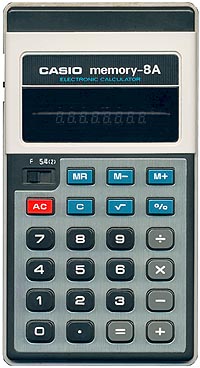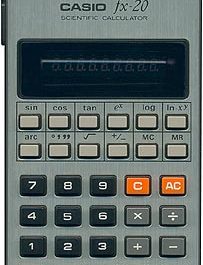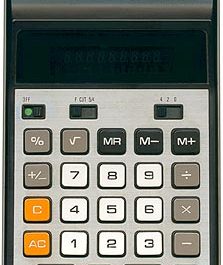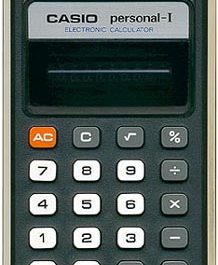
The Casio Memory-8A, also known as the CD-813, is a handheld calculator manufactured by Casio Computer Company Ltd. in Japan in 1976. This sleek, slab-shaped calculator measures approximately 75mm x 135mm x 22mm (width x height x depth) and weighs around 130g without batteries. It is powered by two AA batteries or an optional AD-2S 3V 0.2W adapter.
The calculator features a three-piece smooth plastic case with a white base and black and white front panel. The neutral display filter is flat and slightly recessed, providing a clean and bright image for the 8-digit blue VFD display. The calculator’s keys are typical of Casio’s design, with a squishy feel but reliable operation. The keys are surrounded by a brushed aluminum panel and black plastic escutcheons, adding to the calculator’s aesthetic appeal.

In terms of functionality, the Casio Memory-8A offers standard four functions (addition, subtraction, multiplication, and division) along with percentages, square root, and a three-function memory. It can operate in both floating-point and two-decimal-point modes, selectable via a front switch.

The calculator’s logic and operation are as follows:
- The (C) key cancels the current entry, while the (AC) key clears the entire calculator.
- Input overflow is suppressed, and inputting a ninth digit is ignored.
- Negative numbers are shown with a “-” in the immediate left digit, but the calculator is limited to seven-digit negative numbers due to the lack of a ninth digit.
- A constant function is available for multiply and divide operations by double-hitting the operator.
- Negative square roots are allowed and result in a negative number.
- Divide by zero displays an “E” in the far-right (first) digit and is not recoverable.
- Overflow also displays an “E” in the far-right (first) digit and is not recoverable.
- Memory storage is not indicated, and (AC) clears the memory.
- The calculator has the “negative zero bug” where (-1) + 1 results in “-0”.

The Casio Memory-8A is a compact and stylish calculator from the mid-1970s, offering basic arithmetic functions and limited memory capabilities. While its logic has some limitations, such as the negative zero bug and lack of recovery from certain errors, it remains a notable entry in Casio’s early calculator lineup.


